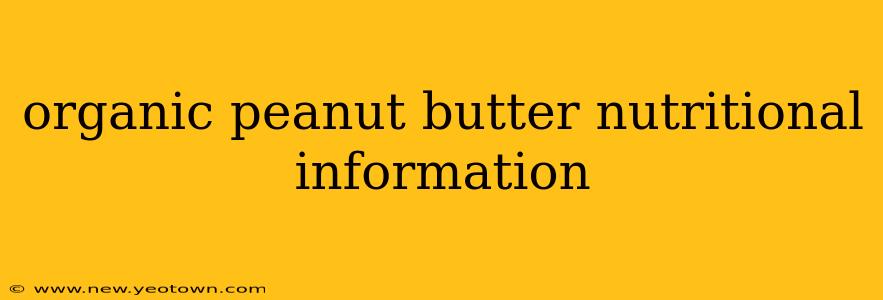The satisfying crunch, the rich aroma, the creamy texture… peanut butter is a beloved treat for many. But beyond its deliciousness lies a nutritional profile that deserves a closer look, especially when you opt for the organic variety. This exploration dives deep into the nutritional information of organic peanut butter, addressing common questions and highlighting its health benefits.
Let’s begin our journey with a simple truth: organic peanut butter is generally quite similar in its nutritional makeup to conventionally produced peanut butter. The key difference lies in how the peanuts are grown. Organic peanuts are cultivated without the use of synthetic pesticides, herbicides, or genetically modified organisms (GMOs). This commitment to sustainable farming practices offers potential benefits beyond just the absence of these chemicals. But the core nutritional values remain remarkably consistent.
What are the nutritional benefits of organic peanut butter?
Organic peanut butter, like its non-organic counterpart, packs a powerful punch of nutrients. A typical serving (around 2 tablespoons) offers a significant amount of:
- Protein: Essential for building and repairing tissues, supporting muscle growth, and maintaining overall health.
- Healthy Fats: Primarily monounsaturated and polyunsaturated fats, which are beneficial for heart health. These fats contribute to satiety, keeping you feeling full and satisfied for longer.
- Fiber: Crucial for digestive health, promoting regularity and preventing constipation.
- Vitamins and Minerals: Organic peanut butter is a good source of Vitamin E, magnesium, and potassium, all vital for various bodily functions.
How many calories are in organic peanut butter?
The calorie count in organic peanut butter is roughly the same as non-organic, usually hovering around 190-200 calories per 2-tablespoon serving. This calorie count is influenced by the type of peanut butter – added sugar, salt, or oil can increase the calorie content. Always check the nutrition label for the specific product you're consuming.
Is organic peanut butter better for you than regular peanut butter?
This is a question with nuanced answers. While the core nutritional profile is very similar, choosing organic peanut butter means you're avoiding exposure to synthetic pesticides and herbicides used in conventional farming. For individuals sensitive to these chemicals, this difference can be significant. Additionally, the commitment to organic farming often reflects a broader commitment to sustainable agricultural practices, which benefits the environment. However, the primary health benefits – the protein, healthy fats, fiber, and vitamins – are present in both organic and non-organic options.
What are the potential downsides of organic peanut butter?
One potential downside is the price. Organic peanut butter is often more expensive than conventionally produced peanut butter. Additionally, some individuals may experience allergic reactions to peanuts, so it's essential to be mindful of allergies before consumption. Finally, always check the ingredient list. Some brands add sugar, salt, or other additives which can negatively impact the nutritional profile.
Does organic peanut butter expire faster than regular peanut butter?
There's no definitive evidence that organic peanut butter expires faster than regular peanut butter. Proper storage – keeping the jar sealed tightly in a cool, dark place – is crucial for extending the shelf life of both. Always check the "best by" date on the label for guidance.
How to choose the best organic peanut butter?
When selecting organic peanut butter, prioritize brands that use only peanuts and perhaps a small amount of salt as ingredients. Avoid brands with added sugars, oils, or other additives. Look for certifications from reputable organizations to ensure the product meets organic standards. Reading reviews can also provide valuable insight into the quality and taste of different brands.
In conclusion, organic peanut butter offers a delicious and nutritious way to incorporate healthy fats, protein, and fiber into your diet. While the core nutritional benefits are similar to non-organic peanut butter, the commitment to sustainable and pesticide-free farming practices might make it a preferable choice for environmentally conscious consumers and those seeking to minimize exposure to synthetic chemicals. Always check the nutrition label and ingredient list to make informed choices that best suit your individual needs and preferences.

